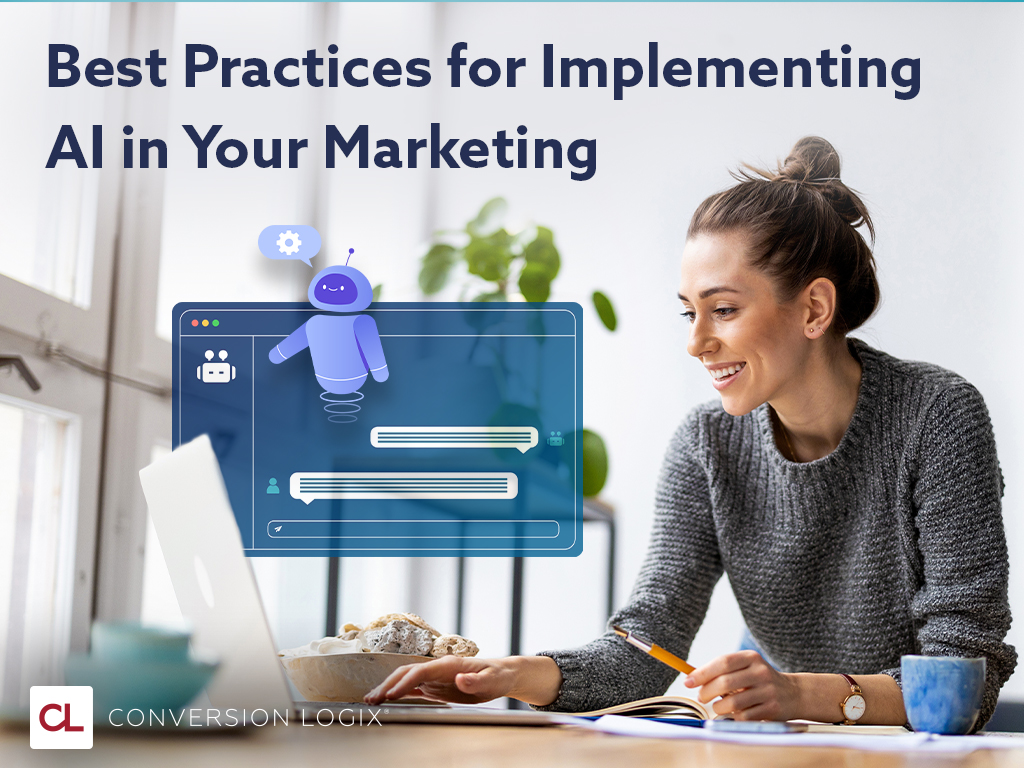Best Practices for Implementing AI in Your Marketing
- 15 March 2024

Artificial Intelligence is here to stay. With more and more companies adopting the technology, you will be left behind if you don’t incorporate (or at least plan to incorporate) AI into your marketing strategy. But you also don’t want to implement AI just for the sake of doing it. You need to ensure it works to your benefit and delivers the desired results.
But we’ve always known new technology can be overwhelming. So before we dive into best practices for your AI implementation, let’s break down what it means to use AI in marketing.
Defining AI in Marketing
There’s a wealth of possibilities with AI in marketing so it’s easy to get lost when you’re just getting started. Here are the two most important applications of this new technology for marketers:
Predictive AI. This analyzes patterns in your data to predict possible outcomes. For example, it can look at your contact list and let you know which behaviors and attributes make a lead more likely to convert.
Generative AI. This type of AI helps create text and images based on known patterns from previous data. A good example of this is ChatGPT, which is now being used to generate text answers to questions and prompts. In the design world, even established editing software like Adobe and Canva are now leveraging Generative AI to edit and produce imagery.
Implemented together, these two forms of AI can enable you to automate repetitive tasks, segment your audience, and reach out to these segments with personalized messages and offers.
Implementing AI: Best Practices
AI systems are one of the most powerful tools marketers can leverage to increase marketing performance with limited resources. Here are some best practices for implementing AI to ensure you get the most out of this amazing technology.
Plan your approach by setting clear goals.
Hopefully, your marketing goals are already in place even before implementing AI. This will help in identifying how AI aligns with your overall marketing strategy and which specific areas it can work to support your goals.
Here are some common AI use cases in marketing to help you identify how it fits into your strategy:
- Audience segmentation. For businesses managing hundreds and thousands (or more!) of leads, AI can help segment audiences based on their interests, traits, and behaviors. For marketing teams, this is important in creating more informed decisions and effective campaigns.
- Chatbots. AI chatbots deliver a more personalized and seamless customer service experience, even during times of day when no live agent is available. Once trained, AI chatbots can quickly close tickets with answers that are more relevant and personalized to your prospects.
- Content generation. As AI can pull information from multiple sites quickly and easily, it can guide content creation teams during the research phase. With the right prompt, AI can also generate working outlines that writers can easily follow and edit to churn out blogs, social media copy, and other written content.
Ready your data.
In this age of big data, managing customer information can be very tricky. While AI can help you harness data into something usable for your team, it is important to have clean, high-quality data before doing a full AI implementation. AI systems can only be successful if the data it is fed to analyze is accurate and relevant.
Identify which workflows you can automate.
One of the benefits of implementing AI into your marketing strategy is that it allows you to save time and money by eliminating redundant and monotonous tasks. Identify these tasks, such as data entry, email or social media scheduling, and report generation, to speed up workflows and focus on more important tasks, such as campaign ideation and strategic initiatives.
Enable your people.
As amazing as AI is, it still cannot replace human expertise, so treat AI as a companion and not a replacement for what you and your team can do. Train your team on how AI fits into their daily work routine and allow for continuous learning of the new tools and processes. This also eliminates people’s fear of the new technology, easing their worries about being replaced and instead assuring them that AI is only here to enhance the way things are done.
Stay ethical and adhere to data privacy laws.
With data collection becoming more intrusive and with data being used for personalized marketing implementations, it’s important to build a strong ethical, technological foundation. Be transparent to your prospects about the kind of data you are collecting and how the data will be used. Ensure your AI implementation is data privacy compliant, and take time to review laws periodically so you can make adjustments when necessary. As required by most countries, give a clear opt-out option for your leads.
Level-Up Your Marketing Strategy: Start Using AI
Integrating Artificial Intelligence into your marketing strategy is no longer a trend but rather a necessity to stay competitive in today’s digital landscape. By embracing AI as a complementary tool to human expertise, you can harness its power to drive meaningful results and enhance the overall customer experience.
Interested in learning more about AI marketing? Subscribe to our newsletter and stay up-to-date on the latest AI marketing trends.
Schedule a Call